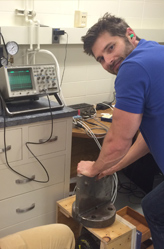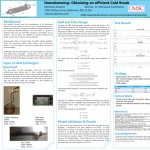Chemical Engineering
“Optimization of a Shell and Tube Heat Exchanger for Wort Chilling”

This study encompassed the effective thermal design and build of a shell and tube heat exchanger for single phase fluid flow. This exchanger was to be used to cool wort in the making of beer to present an alternative solution for the home-brewing market. For this market, there are relatively few solutions available for chilling wort. The available options are immersion chillers and plate chillers. The chillers have both advantages and disadvantages. The immersion chiller is inexpensive and easy to clean but inefficient; the plate chiller is more expensive and efficient, but not easy to clean. A well designed shell and tube heat exchanger was expected to combine the benefits of both. The minimum heat transfer area was designed based upon an optimized configuration which considered number and layout of tubes, tube length, number spacing, cut of baffles, and shell diameter. A MATLAB program was created and implemented to size a test heat exchanger. Upon completion of optimized design, construction and testing occurred to determine if the heat exchanger performed to design specifications. The exchanger performance was compared against the immersion and plate chillers, respectively. It was expected that the shell and tube exchanger would outperform existing solutions.

How did you know that research at NIST was what you wanted to do?
I have used the NIST information form for research and homework before and I thought it would be neat to actually participate in that process.
Was the application difficult to do? Did you have help with this?
The application was not difficult to do, but it did take time. I did not have help other than to have it reviewed before submitting it.
Who is your mentor for your research, scholarship, or artistic project?
My mentors are Dr. Marc Levitan and Dr. DongHun Yeo. I arrived at these because I asked to work in the Engineering laboratory at NIST and was offered a position there.
How much time do you put into this work? Are you paid?
I work from 8 am to 4 pm everyday on the project and tasks that I have been assigned. I am being monetarily compensated for this internship.
What academic background did you have before you started?
I am an undergraduate chemical engineering student going into my senior year this fall. I am also a licensed master plumber and have military experience as an Electronic Warfare Journeyman. I have also done work as a project manager/estimator.
How did you learn what you needed to know for this project?
I was provided papers to review by my mentors. I also do my own research and call upon past knowledge to address each task as it arises.
What was the hardest part about your research?
The hardest part of my research is that I had no experience going in about this subject specifically.
What was the most unexpected thing?
The most unexpected thing is that my previous knowledge as a chemical engineering student can be directly applied to this field as well. I had a better understanding of some of the tasks that were appointed to me because of my experience with chemicals and heat transfer.
What is your advice to other students about getting involved in research?
Do not be afraid to do something if it is not directly in your field of experience.
Are you a transfer student or did you start at UMBC as a freshman? Do you live on campus?
I am a transfer student to UMBC. I commute to UMBC.